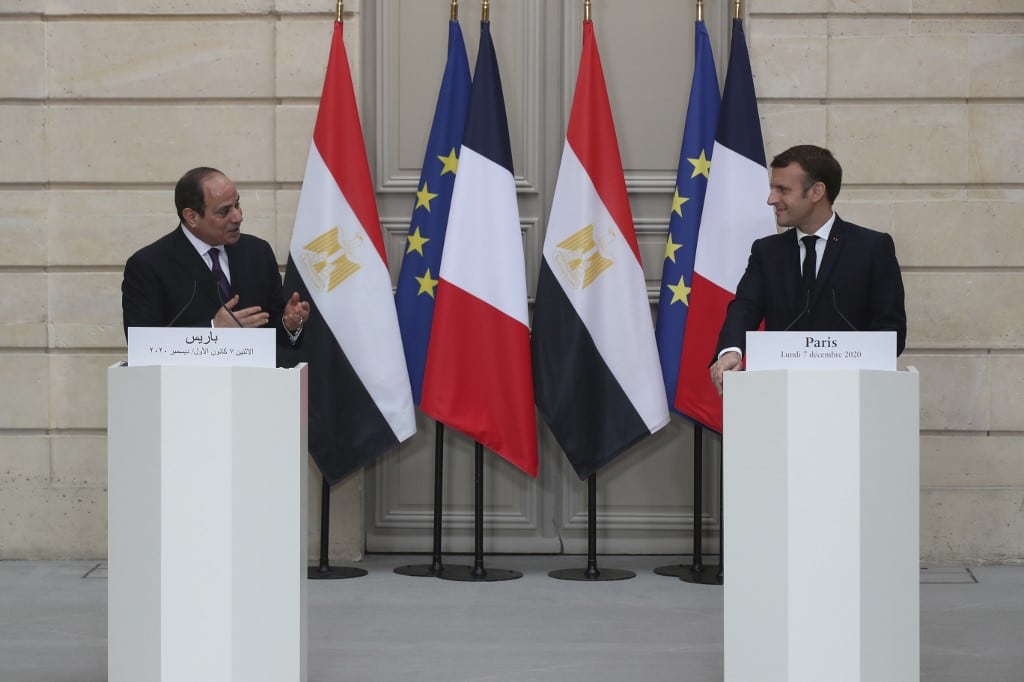
Florence Massena
Before and following the diplomatic visit of Egyptian President Abdel-Fattah el-Sissi to meet French President Emmanuel Macron in Paris during the first week of December 2020, many concerns and critics have been raised by human rights organizations about the human rights abuses committed by the Egyptian government. But in France, everything was done to prevent any uneasiness for the Egyptian President.
Trade over human rights. That seemed to be the motto for Macron during the visit of el-Sissi in Paris, where both heads of state remained mostly out of the media’s eye, both local and Egyptian. In one of the rare communications with the media through a joint press conference on December 7, 2020, Macron said that: “I will not condition matters of defense and economic cooperation on these disagreements [over human rights] […] It is more effective to have a policy of demanding dialogue than a boycott which would only reduce the effectiveness of one of our partners in the fight against terrorism.” During the visit, Macron even gave his Egyptian counterpart the highest French decoration of all: the medal of honor.
Ahead of the meeting, 20 human rights groups had issued a statement saying that Egypt was “abusively using counterterrorist legislation to eradicate the legitimate work in favor of human rights and suppress all peaceful dissent in the country” and asking Macron to react to that. Which he said he did, by talking directly about the matter with el-Sissi but without going as far as issuing diplomatic or commercial sanctions. The Egyptian government, since el-Sissi’s 2013 coup, has been arresting massively Islamist supporters of his freely elected predecessor, Mohamed Morsi, and pro-democracy activists, including NGO workers and journalists. Just a few days before the diplomatic visit, three members of the Egyptian Initiative for Personal Rights (EIPR), were released, after having been arrested in November 2020 for alleged links with a “terror group” and “spreading false news”, following international pressure.
Already in the last quarter of 2020, French Foreign Affairs Minister Jean-Yves Le Drian had traveled to Egypt in order to show that France wasn’t anti Islam during the anti-France movements that erupted in many Muslim-majority countries after yet another scandal over cartoons depicting the Prophet Muhammed. “We have a first principle which is the highest respect for Islam” Le Drian said at that occasion. “I also want to say that Muslims are fully part of society in France.”
All of this is not very surprising, according to Raphaël Gourrada, doctor in political sciences (EHESS) and fellow at Open Diplomacy Institute. “For four-five years now, there has been a rebalancing of the regimes’ fracture lines after the Revolutions in the MENA region”, Gourrada told Fanack. “The Gulf monarchies form a united front with Egypt since 2013 against the package of revolutionary forces and political Islam. It has been strengthened by the rise of ideologies from Al-Qaeda movement. Occidental diplomacy, including France, has been following this trend. You can see it on the Libyan ground, where the French diplomacy openly supports al-Haftar general, like the conservative fronts. There has been a convergence of agendas with a shift of priorities. Now, there is a strong anti-Iranian front, you can see it with the Abraham Accords [a peace treaty initiated by the US and signed by the United Arab Emirates and Israel, therefore prompting the recognition of Israel in the MENA region].”
France is therefore put in a difficult situation, trying to find a balance between its strategic interests in the region and the world, notably diplomatic and commercial, and its alleged values of human rights’ respect, freedom and solidarity. “With all of this, official meetings between France and heads of state are limping and perilous exercises”, Gourrada said.
A precarious position that we can also notice with Turkey, country belonging to the political Islam front and therefore opposed to the one France belongs to, despite the French diplomacy trying to remain neutral when it comes to Turkey. Within the October 2020 anti-France movements in Muslim-majority countries, Turkey announced that it would boycott French products from now on. “Turkey reacted against France as itself”, Gourrada told Fanack. “If you consider the strategic positions of Erdogan, he is against al-Haftar in Libya and the French involvement in Syria in 2015-2016, and he supports Qatar. It is a clear opposition between France and Turkey’s regional strategic enterprises. And you have also to take into account that fact that France stiffened its speech on the question of political Islam since the attacks of 2015 [in January, a shooting against Charlie Hebdo staff, and in November simultaneous attacks in the streets].”
Eventually, France and Turkey are claiming two very different diplomatic lines. In Paris, it’s is about being strong against terrorism and political Islam, and in Turkey it is about blaming strongly the French diplomacy, especially following the French and Kurdish association in Syria that threatened for a time to having a Kurd state recognized.
“Therefore, it’s easy to understand why Egypt is spared by France”, Gourrada said. “In a context where France is accused of Islamophobia and such a strong anti-France feeling is erupting in the MENA region, it is important to maintain good relationships with the second highest Sunni place in the world. It’s like buying credibility, France is not the enemy of Islam. It just shows that France is afraid to end up diplomatically isolated.”


